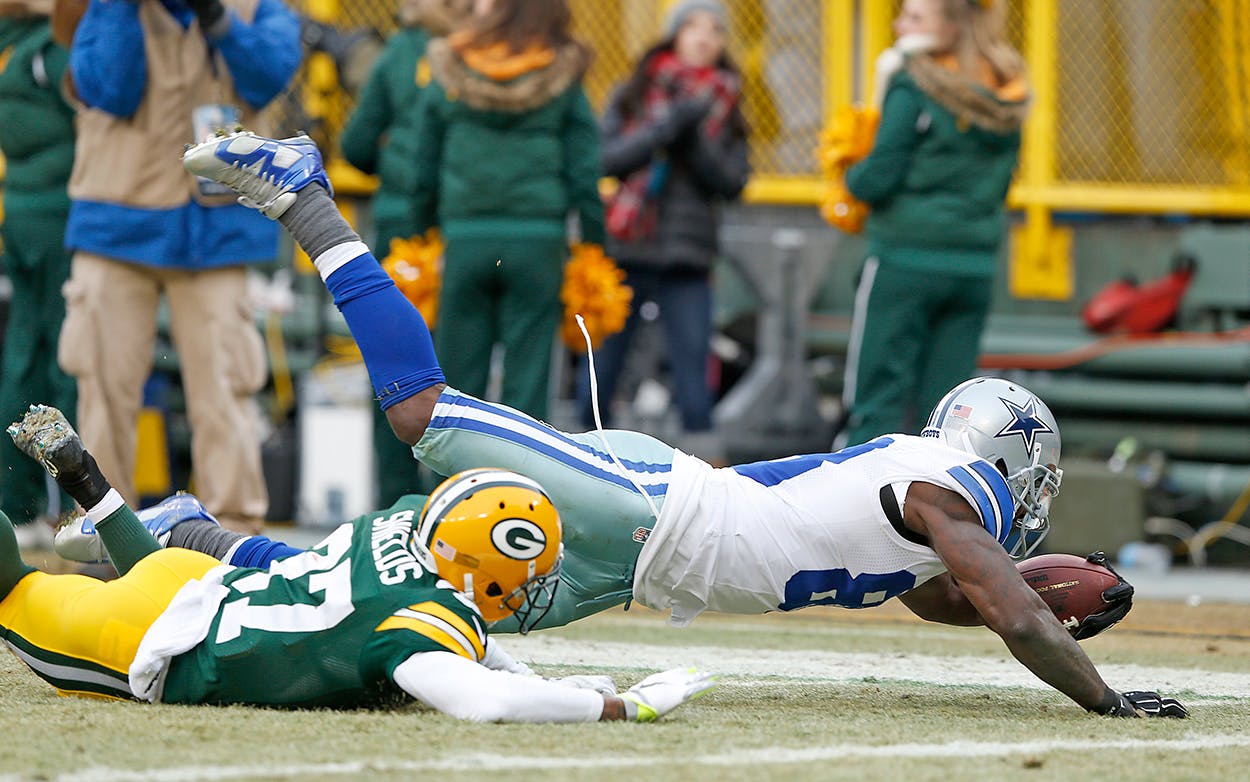Hi, Dallas Cowboys fans! What’s your most frustrating memory? Is it slamming your finger in the car door this morning? Being stuck for two hours in traffic on the Dallas North Tollway knowing that you were paying for the privilege of going so slowly? Or is it—like we suspect—the 2014 Dallas Cowboys playoff game? You know the one. There were four minutes left in the game and the Cowboys were down by just five points; Tony Romo threw a perfect pass to Dez Bryant, who somehow hauled it in over the body of a Packers defender, propelling himself forward as he did so to heroically reach the end zone. And then, the obvious and completed catch was overturned on replay review. Remember that?
The question of what is or isn’t a catch has been baffling fans since before Dez’s play was overturned. In 2010, in the Detroit Lions’ season opener, receiver Calvin Johnson had a pass ruled incomplete because he placed the ball on the ground as he got up in the end zone, which sparked the initial debate.
On Tuesday, the NFL’s Competition Committee met to discuss changes to the catch rule. Going forward, the committee will make recommendations on how to simplify the rule beyond the current confusing morass. But at this point, one thing is clear: according to committee member and New York Giants owner John Mara, everyone agrees that #DezCaughtIt. “I think where we are unanimous [are] plays like the Dez Bryant play in Green Bay, going to the ground, the Calvin Johnson play from a couple of years ago,” Mara told ESPN. “I think all of us agree that those should be completions. So let’s write the language to make them completions.”
Previous versions of the rule explained that a receiver became a runner after he made “a football move,” which was an entirely subjective standard that described something ineffable. But that language was removed after Bryant’s catch, because it clearly wasn’t being followed anyway. (If diving forward with a football in your hands after catching it in the air isn’t “a football move,” nothing is.) Instead, the rule described the “initial contact” with the ground as the deciding factor in what was or was not a catch. That standard was equally bizarre—here, watch Chicago Bears tight end Zach Miller have a touchdown overturned while nearly losing his leg below the knee in the process, because after sitting up two full seconds after catching the ball, he placed it on the ground to assess the damage to his body.
https://twitter.com/patriotszn/status/924712517418536961
That play was overturned on replay.
Few examples are quite so egregious as Bryant’s catch, but every fan of every team likely has a similar moment of frustration. And every time, the referees have to attempt to explain in clear language what exactly the receiver did wrong, resulting in grown men saying “the ball moved while in the receiver’s possession” to a hundred thousand angry spectators, hoping they’d be placated.
Of course, there was one high-profile game during which those rules were a bit relaxed. In the Super Bowl earlier this month, Nick Foles threw a couple of touchdowns-that-weren’t—except they were, to the consternation of broadcasters Al Michaels and Chris Collinsworth, who’ve spent the better part of the last decade defending refs who are doing their best to enforce a rule that may as well be written in Klingon. In that case, the standard required to determine if a pass was completed seemed to be, “If saying that it’s incomplete is going to further embarrass the league on its biggest day, it’s a catch.”
And you know what? That is actually a pretty good standard to apply. Football is a game. Sometimes the rules are going to be a little unclear. How that is addressed in the rulebook is a big question, but if the judgment calls and human error in the officiating leads to plays that make sense to most people watching at home, that beats the frustration of watching Bryant spin forward toward the end zone with the ball in his hands on YouTube yet again, knowing that for a reason you’ll never be able to explain to another human being, it wasn’t actually a catch. Because actually, it was.
- More About:
- Sports
- NFL
- Football
- Cowboys
- Dez Bryant








